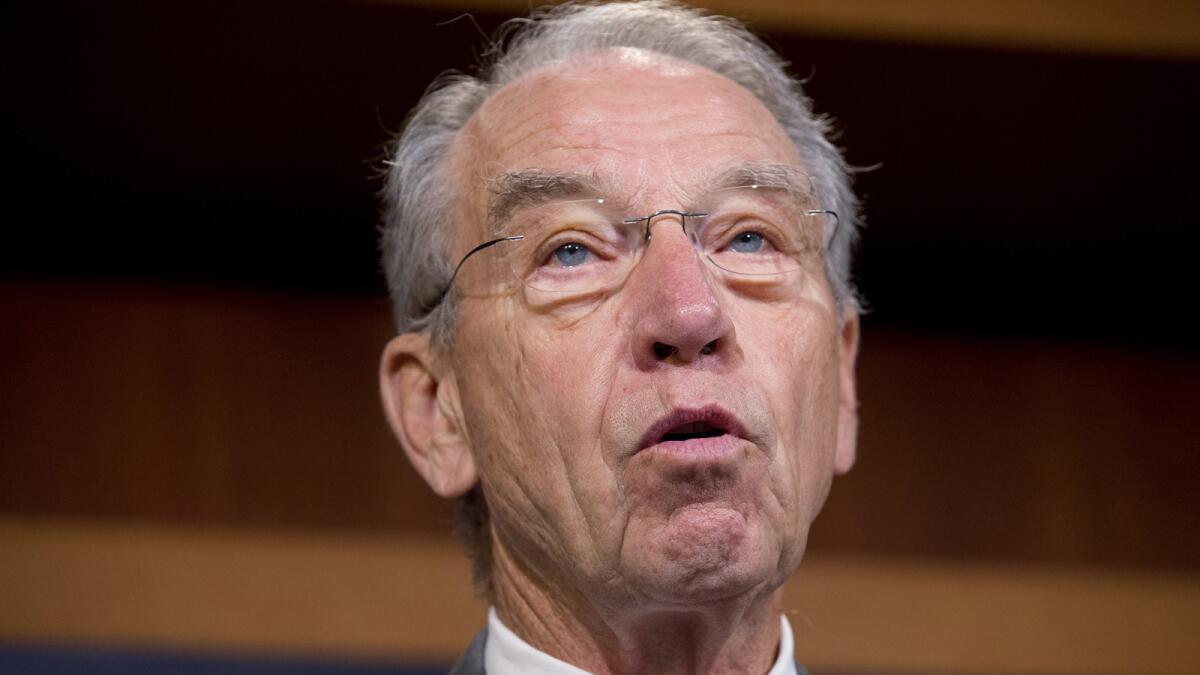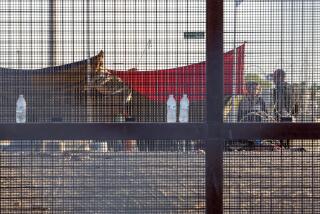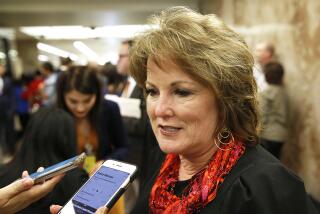Young immigrants are at risk from sponsors with criminal records, senators say

Sen. Charles E. Grassley is investigating whether immigrant youths were placed in homes with convicted criminals.
Federal officials placed immigrant youths with convicted criminals, including sex traffickers and human smugglers, then refused to remove them even after a whistle-blower alerted officials, two senators alleged Tuesday.
At least 3,400 sponsors -- about 12% of 29,000 listed in a government database -- had criminal histories that included domestic violence, homicide, child molestation, sexual assault and human trafficking, the whistle-blower told Senate Judiciary Committee Chairman Charles E. Grassley (R-Iowa) and Sen. John Cornyn (R-Texas).
“The whistle-blower brought the claims to the Judiciary Committee’s attention after raising concerns with supervisors reportedly yielded no immediate corrective actions,” Grassley’s office said in a statement.
“Although the whistle-blower claims to have relayed these concerns to supervisors in August of 2015, apparently these individuals have no immediate plans to remove [unaccompanied minors] from their criminal sponsors, but are ‘discussing options,’” the senators wrote in a letter to the secretaries of Homeland Security and Health and Human Services, whose departments are responsible for processing the youths.
Officials from Health and Human Service’s Office of Refugee Resettlement, which screens sponsors, responded in a statement.
“It is not the practice of the Office of Refugee Resettlement to place unaccompanied children with sponsors who have serious criminal convictions,” spokesman Mark Weber said.
“The safety of the children is our primary concern and any allegation of even potential harm is taken seriously and will be investigated.”
Officials have insisted that sponsors are subject to vetting -- including criminal history checks and, in some cases, fingerprint checks -- if the sponsor is not a parent or legal guardian, is considered a safety concern or is claiming a particularly at-risk child such as a trafficking victim. In August, staff members also started conducting safety checks with youths and sponsors a month after placement.
Border Patrol turns over unaccompanied minors to the Office of Refugee Resettlement, which places them at shelters, then with parents, relatives or other qualified sponsors. Federal officials are not required to provide follow-up services. State child welfare agencies are not required to notify federal authorities of alleged abuse or neglect by sponsors.
The resettlement office maintains a database that allows staff members to track sponsor names, addresses, assessments, and the number and names of unaccompanied children they have tried to sponsor, Weber has said.
The Times reported in August that immigrant advocates complained that the sponsor system lacked oversight and follow-up, and that problems worsened last year with an influx of more than 68,500 unaccompanied minors, mostly from Central America. Recent months have seen another increase.
The senators noted in their letter that federal regulations prohibit the youths “from being released to a sponsor if there is substantial evidence that the child would be at risk of harm. Yet, due to a breakdown with screening and background checks of sponsors, many of the most vulnerable are being victimized.”
Although the resettlement office is supposed to conduct background checks for prospective sponsors, “often these background checks are not thoroughly performed and sponsors are not properly vetted or even fingerprinted … and children are paying the price,” Grassley and Cornyn wrote.
The problems are not new, the senators noted: In 2013, the office issued an alert warning of three fraudulent sponsors in Colorado, Iowa and Minnesota who were seeking to claim unrelated unaccompanied minors.
In December, federal investigators rescued half a dozen Guatemalan youths from an Ohio egg farm and arrested smugglers who had posed as sponsors, according to authorities. The youths had allegedly been forced to work without pay and in effect held hostage in dilapidated trailers, The Times reported. Sen. Rob Portman (R-Ohio), chairman of the Senate’s permanent subcommittee on investigations, began an inquiry into that case and into the resettlement office.
But, Grassley and Cornyn wrote, “it seems little corrective action has been taken, and many are still released into criminal hands.”
The senators are demanding that federal officials disclose how many sponsors have criminal records; what background checks, fingerprinting and other sponsor screenings are required; what disqualifies sponsors; and what is done if a sponsor’s criminal history is discovered after youths have been placed with them.
“These questions continue to take on urgency as unaccompanied children arrive at the southern border in record numbers in recent months,” Grassley’s office said.
Grassley started investigating the sponsors’ role this fall after some unaccompanied youths were arrested in connection with the Sept. 4 killing of a 17-year-old Salvadoran migrant living with relatives in northern Virginia. Last month, the senator wrote to Homeland Security Secretary Jeh Johnson inquiring whether the suspects’ sponsors had been screened and held accountable when the youths didn’t appear at immigration court before the shooting.
Of the 16,503 unaccompanied minors whose immigration cases were closed last fiscal year, about half were ordered to be deported, most because they failed to appear in court.
Cornyn and Rep. Henry Cuellar (D-Texas) have called for sponsors to be biometrically screened.
“I would hope we would all agree that it’s our joint and collective responsibility to do what we can to protect them and ensure they are no longer preyed upon by criminals and human traffickers,” Cornyn said in a speech to Congress last week.
“Unfortunately, the current law also requires that these children be released -- sometimes even to nonfamily members, sometimes even to noncitizens -- without any assurance of systematic protections that they are being sent into a safe environment,” he said, “Sadly, we don’t know how many of these children have fallen into the wrong hands.”
In the fiscal year that ended Sept. 30, nearly 40,000 unaccompanied minors were caught at the southern border. Of those, just under 24,000 crossed through Texas’ Rio Grande Valley. Of the total, the biggest share came from Guatemala (12,820), followed by El Salvador (10,872), Honduras (10,671) and Mexico (4,276).
More than 27,500 unaccompanied minors were placed with sponsors, including 3,756 in California, the most of any state.
This month, 6,400 unaccompanied minors were awaiting placement with sponsors, and an additional 4,900 were expected by month’s end, according to a recent report to Congress.
In October, federal officials received 4,603 of the youths, more than double the tally from the same month last year (1,853). That’s because the number of Central American youths and families arriving at the southern border jumped again after dipping from the summer 2014 influx.
Almost 5,000 unaccompanied children were caught at the southern border last month, nearly twice the number in October 2014, according to figures the Border Patrol provided to Congress this week.
The largest group was from El Salvador (1,624), followed by Guatemala (1,510), Mexico (990) and Honduras (787). A majority (3,026) came through the Rio Grande Valley, the epicenter of last year’s influx.
Twitter: @mollyhf
ALSO
Chicago cop to face murder charge in killing of black teen, sources say
Man in prison for 16 years in ‘teardrop rapist’ case has conviction tossed
L.A. art collector vows to cut off funds to Democrats who voted for Syrian refugee bill
More to Read
Start your day right
Sign up for Essential California for news, features and recommendations from the L.A. Times and beyond in your inbox six days a week.
You may occasionally receive promotional content from the Los Angeles Times.







